Minnie Riperton: Spring is Here
'Les Fleurs' - A song of rebirth
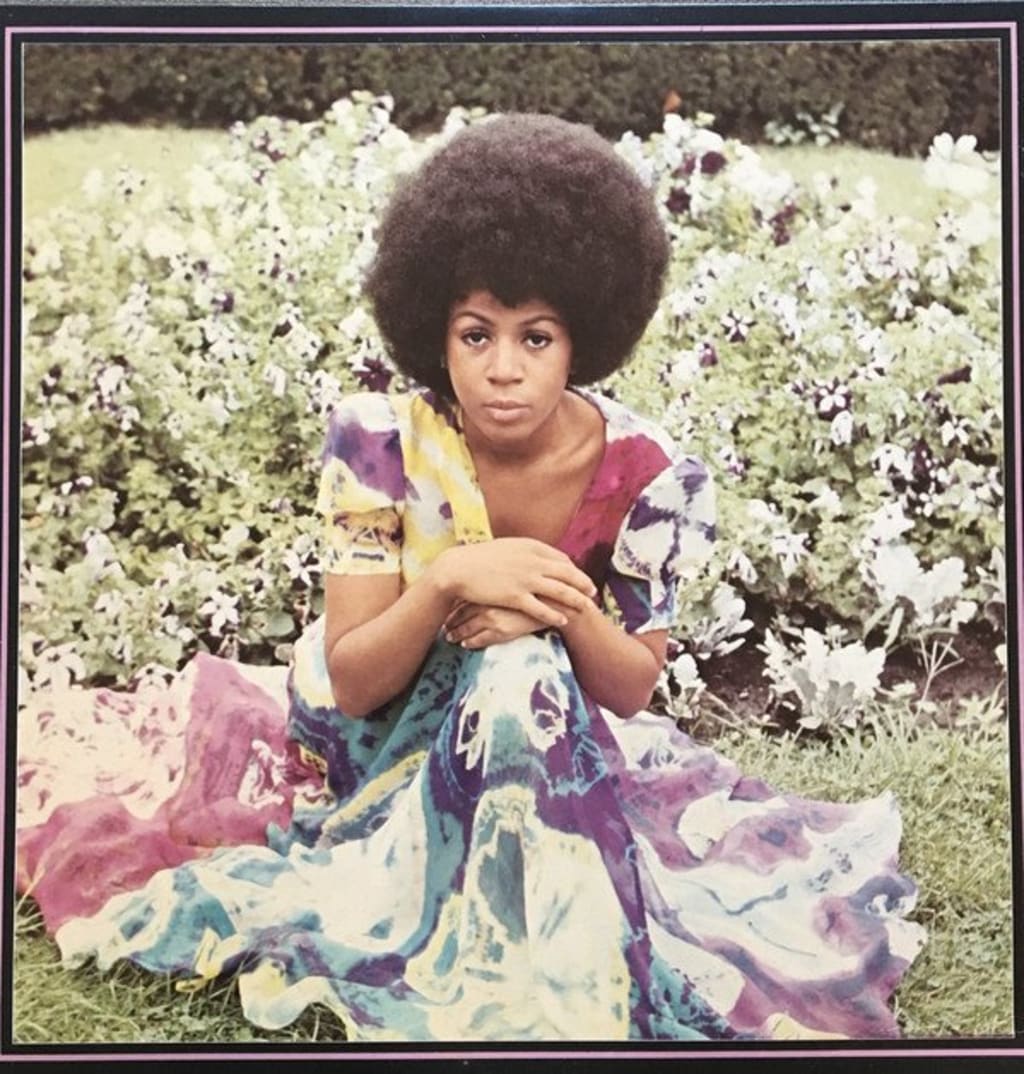
I like songs that surprise you.
I love nothing more than something unexpected happening, when a track takes a thoroughly startling turn, and you say to yourself, "I didn't see that coming." For instance, I especially love it when the chorus isn't so much a logical, building-up of the verses, but a delightful turn into unforeseen territory.
At the same time, I adore music that mirrors a sensation, or an emotion. Because - let's be honest - it so rarely does; so much music is about 'love', but how many songs genuinely capture exactly what that emotion 'feels' like? How many tracks tap into our emotional memory, and leave us saying, "That! That is what 'that' feels like!"
Minnie Riperton's 'Les Fleurs' does both of those things.
It not only takes a joyously unexpected turn, its chorus is not only a beautifully bombastic development from its verses, it also captures this time of year. It's a song I listen to, and say, "This! This is what Spring feels like!"
It's four minutes of uplifting, glorious, musical empowerment. And it's the ultimate ode to rebirth.
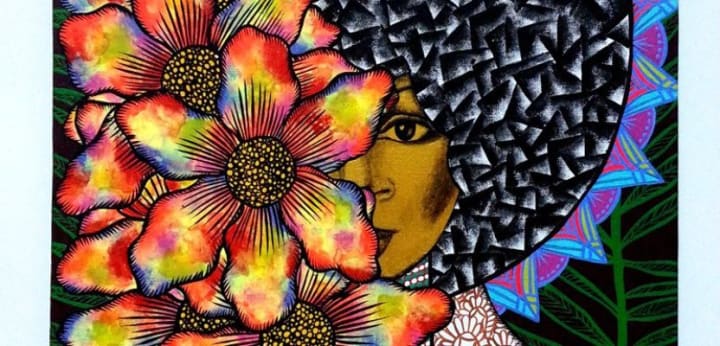
Also, as a bit of music nerd, I find the song fascinating because it's a glimpse into a musical sub-genre that, although probably not particularly well-known, has proven to be incredibly influential. Namely, 'baroque' or 'chamber' soul (you can also have baroque (or chamber) pop or rock).
Additionally, there's a story behind the artist (and therefore the song). A story of an incredibly talented, and versatile, artist whose life was cut tragically short, leaving us to imagine what other wonders we were deprived of.
That's arguably the reason why Minnie Riperton is not spoken of in the same reverent, and hushed, tones as Aretha, or Billie, or Nina, or Ella, or Tina, or Diana, or even Beyonce: She didn't simply didn't produce as much as those other fantastic artistes.
However, I would argue that for 'Les Fleurs' alone she deserves a spot in the Pantheon of black female singers.
Heck, forget the labels: She is one of the greatest singers of all-time full-stop. And her most famous song is a copper-bottomed masterpiece.
And that's where we'll start: With the song itself.
'Les Fleurs'
The track opens with a gentle, mellow, drum-beat, and an intricate, repeating guitar pattern. It's seductive, hypnotic, but low-key.
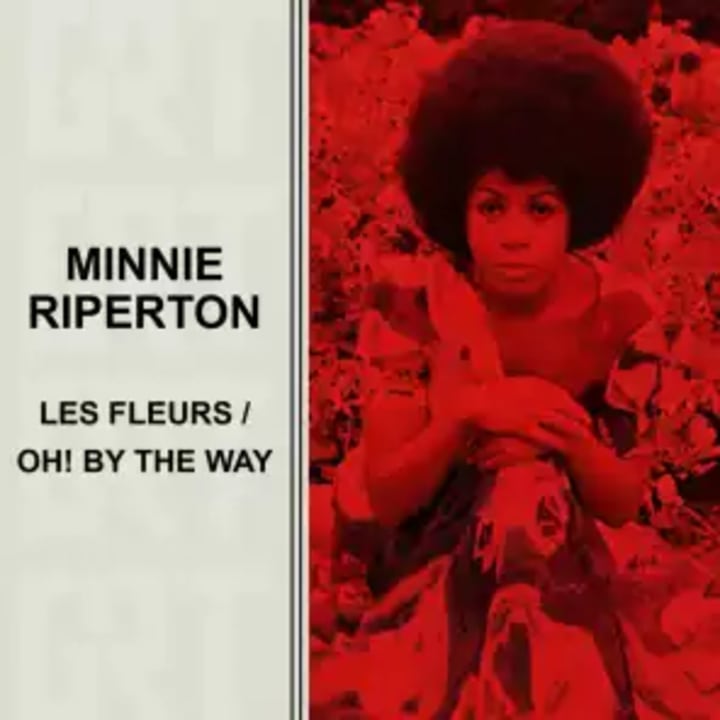
For me, it speaks of those days at the end of Winter, when nature is in stasis; although underneath the soil those roots may - slowly - be growing, on the surface very little seems to be happening.
But we know something soon will. Soon Spring will bloom.
Although the song's opening coda is soothingly hypnotic, it doesn't last for long. I could listen to it for days; however, the people behind the track - cleverly - kept it short. Riperton begins the first verse just over ten seconds in, adding another layer of calming peace.
At least, to begin with that is.
Riperton assumes the personality, the character, of the titular flower itself. Half-speaking, half-singing, she asks the listener;
Will a lady pin me in her hair?
Will a child find me by a stream?
Her voice is gentle, honeyed, and there's a hint of melancholy; will the flower be neglected? Will its beauty be recognized?
But, the atmosphere created by the lyrics is beautifully counter-matched by the music behind them. We still have that mesmeric guitar, and drum pattern, but there's another layer slowly being added, and developed due Charles Stepney's string and horns arrangement.
(And this is where we take a very brief detour into musical nerdishness.)
A Fusion of Past & Present
Although not the most famous example of this sub-genre, 'Les Fleurs' is, nevertheless, one of the important instances of 'baroque' soul. It's a style that arose in the mid-1960's which fused either rock, pop, or R&B with elements of classical music.
The true genesis of this sub-genre is difficult to discern.
One argument is that, aided by drugs, and the rejection of established, post-war social (and therefore also musical) models, songwriters, and producers became more experimental, more 'outward' looking, embracing genres and ideas outside of the ones they were ordinarily expected to be confined by. If a group now wanted their three-minute pop song to be built around a harpsichord, or a full orchestra, so be it.
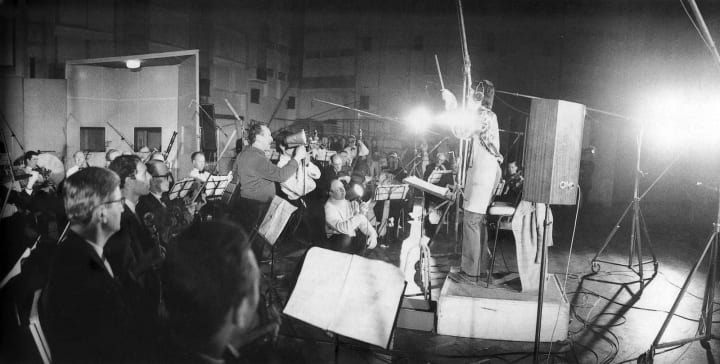
Who cared if such instruments were normally the reserve of Vivaldi, or Mozart? Such rules no longer applied.
A contributing factor was that developments in recording technology enabled artistes to be bolder; it wasn't simply a case of saying 'I love Bach's lush orchestral sound' - now producers, and bands not only had the technology to capture their own lush orchestral sounds, but to also mix that into their own style. A decade previously, it wasn't physically possible; in the 1960's, the modern recording studio made nothing impossible.
However, there's also a much more prosaic answer.
This was a period in which the recording label still held power. Very often, an artiste would be 'assigned' a producer by the label. This was someone the 'suits' trusted. Someone reliable, someone who'd bring the project in on time, and on budget. It wasn't, necessarily, someone with any degree of affinity with the artistes' specific musical style; the producer was a solid technician, no more.
As a result, a soul singer could be given a producer who had worked their way up the ladder producing classical music. A pop group could be put under the stewardship of someone who'd produced countless comedic novelty records.
In the past, such things didn't matter. All that mattered was the project in hand. However, just as greater experimentation was making the recording process more democratic, barriers were also being broken between the people manning the mixing desk, and those in the recording booth.
Suddenly, echoing the spirit of the times, ideas were flowing both ways. After all, that guy who'd produced hundreds of classical albums - how priceless could that knowledge be? How many new and different ways could they 'add' to what was - in essence - a straightforward pop song?
Pop was the first to embrace more 'baroque' elements such as using string sections, woodwinds and brass instruments; Brian Wilson, and The Beatles being the prime exponents. However, soul wasn't far behind.
And nor - in 1970 - was Minnie Riperton.
The Beautiful Bridge
In 'Les Fleurs', there is a clear escalation of the 'chamber' elements in the bridge (that interlude between the verses and the chorus).
Whereas, in the verse, they lurked in the background, the strings, and horns, now take greater prominence. An aural landscape is slowly emerging. And, musically, things are speeding up; we are building towards... something.
Metaphorically, we are now leaving Winter; Spring is about to be sprung. In our mind's eye, we can visualize buds emerging from the dark earth, beginning to sprout.
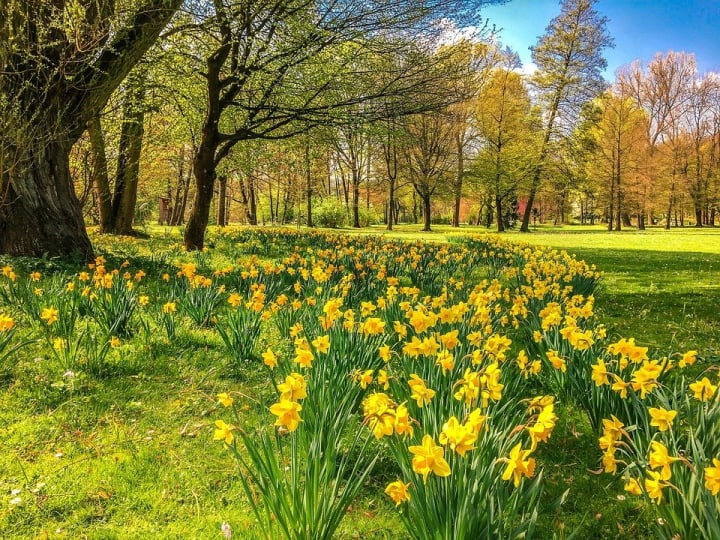
This is supported by the lyrics;
For all of these simple things and much more a flower was born
It blooms to spread love and joy faith and hope to people forlorn.
It should be meaningless, hippy-dippy frippery. But, the building of both tempo and texture gives it weight. Substance.
As does Riperton's voice.
Until now, Minnie has resolutely stayed in first gear. Gently, she now begins to work her way through the gears. There is both silk, and steel; a fragility, that seems so delicate it could crack at any second, alternating with a robustness so solid it pierce ice. Hitting high notes, then crashing low again; a beautiful display of vocal range.
A range she had been developing since childhood.
She was born in Chicago, in 1947, into an art-loving family. Her parents recognized her natural vocal talent from a young age, and Minnie was dutifully packed off to singing lessons. But, it wasn't R&B she studied; it was opera.
However, after falling in love with soul as a teenager, her operatic ambitions fell by the wayside. Whilst still at school, she signed to Chess Records, and released a handful of solo singles, as well performing backing vocals on recordings by Etta James, and Fontella Bass.
Although commercial success alluded her, a few years later she joined Rotary Connection as lead vocalist. This was a psychedelic chamber soul act, and the brainchild of songwriter Charles Stepney. However, once more, none of the band's three albums sold well.
However, it was then that Riperton began to work on her debut, solo album, 'Come to my Garden', which - in addition to Stepney - also involved the considerable talents of writer, and producer, Richard Rudolph. The man she would later marry.
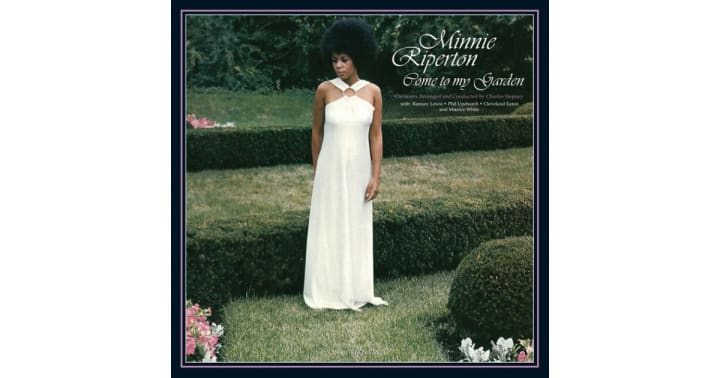
It's a fantastic album. Stepney and Randolph were exceptional songwriters, who were able to craft songs that both showed Riperton's soulful side, as well as tap into her background in classical music and opera.
However, despite critical acclaim, the album was - again - not commercially successful. In hindsight, this isn't an outrageous surprise. Like many examples of 'baroque' (or 'chamber') soul, it's an overpowering hybrid of soul, rock, and the quasi-classical. I'm not surprised that listeners didn't quite to know what to make of it, and that it's taken time to find an audience.
Ironically, Riperton’s next album, 'Perfect Angel', adopted a more straightforward R&B sound, and was to be her - long-awaited - commercial breakthrough.
Her second album is still good. Very good, in fact. It's undoubtedly more accessible than her debut outing.
However, for me, that's why it's not as good. 'Come to my Garden' may be more idiosyncratic, but it's also big, bold, and full of lush aural landscapes.
The greatest of which is 'Les Fleurs.'
THAT Chorus
The opening verse of 'Les Fleurs' sets a mellow, hypnotic mood.
The bridge builds on that foundation, hinting at the bloom to come.
The chorus... well, it's the musical equivalent of all Hell breaking loose. Spring has sprung. And it has done so with bombastic certainty.
The orchestra swells, and we're given a choir to supplement Riperton's own vocals.
Ring all the bells sing and tell the people that be everywhere that the flower has come
Light up the sky with your prayers of gladness and rejoice for the darkness is gone
Throw off your fears let your heart beat freely at the sign that a new time is born.
"Ring all the bells... Light up the sky... Throw off your fears..." - it's a time for celebration! To rejoice in the new Season; in the new you.
Stepney, Rudolph, and Riperton throw everything at this - horns, strings, the works. And it's glorious.
THIS is what re-birth sounds like. It's loud, and it's unashamedly 'big.'
It's a life-affirming masterpiece.
It's THE song for Spring.
Those buds are now blooming. As the music swirls, and crashes around us, in our mind, we see can acres of colorful flowers explosively open, as if we're watching a film which has been sped up.
And, as we slowly begin to emerge from our Coronavirus-induced hibernation, it couldn't be more apt. We've all been in stasis for so, so long; it's time for us all to finally bloom, and enter Spring. Literally and metaphorically.
The End
Although Riperton continued to achieve success, she was deprived of longevity: She was diagnosed with breast cancer in 1976. And, on Thursday, July 12, 1979, while lying in her husband's arms, Minnie died while listening to a recording Stevie Wonder had made for her.
She was only 31 years old.
In addition to her music, she also left behind Rudolph, and their two children. One of whom is the comedic actress, and SNL alumni, Maya Rudolph.
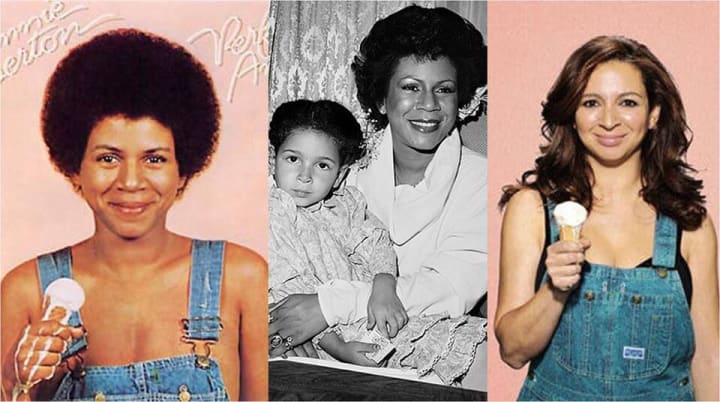
The loss of other potential masterpieces we've been deprived of can never match the loss Riperton's family endured. A short life, one in which an untold memories - of a wife, and a mother - were never allowed to be created.
What is left behind is a body of work that, although not extensive, is both beautifully brave, and wonderfully varied.
And, standing tall, like a glorious, bold sunflower, is one song. A song about Spring. About now.
The majestic 'Les Fleurs.'
Thank you, Minnie.
----------------------------------------------------------------------------------------
If you've liked what you've read, please check out the rest of my work on Vocal. Among other things, I write about film, theatre, and mental health: The story of my admission to a psychiatric ward, and my attempts to rebuild my life following my discharge, starts with 'Flow: The Psychiatric Ward' - https://vocal.media/psyche/flow-the-psychiatric-ward
You can also find me on The Mighty and Elephant Journal - https://www.elephantjournal.com/profile/christopher-donovan/
If you've really liked what you've read, please share with your friends on social media.
If you've really, really liked what you've read, a small tip would be greatly appreciated.
Thank you!
About the Creator
Christopher Donovan
Hi!
Film, theatre, mental health, sport, politics, music, travel, and the occasional short story... it's a varied mix!
Tips greatly appreciated!!
Thank you!!






Comments
There are no comments for this story
Be the first to respond and start the conversation.